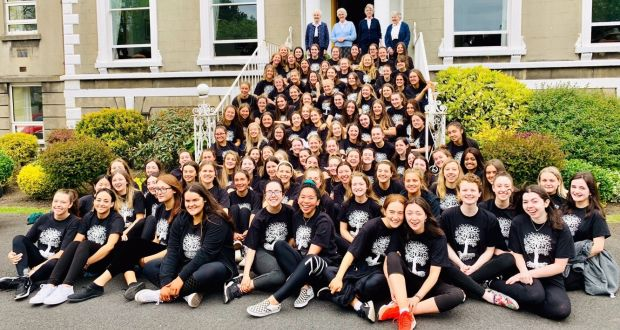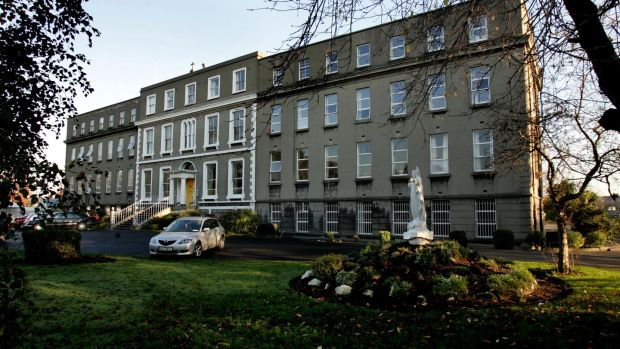Tributes have been paid to Dominican Sisters who pushed boundaries of education for young women
Some 120 years after they established one of the best known girls’ schools in the capital, the last remaining Dominican nuns have left the Muckross Park campus in Dublin 4.
For staff and past pupils, there has been sadness at the departure of the nuns and the closure of the convent building in Donnybrook.
But there have also been glowing tributes to the legacy of “pioneers” and “trailblazers” who quietly pushed the boundaries of education for young women of the time.
“If you look at the roll-call of students in the early years, there were suffragists, there were campaigners for all the social issues of the times and champions of education,” says Deirdre Mac Mathúna, a history teacher at Muckross Park College and president of the History Teachers’ Association of Ireland.
“There was an attitude of, ‘Why shouldn’t young women become scientists, engineers, doctors, lawyers or teachers?’ It was a case of giving them the opportunity to be who they were meant to be.”
Historical records show science was on the curriculum of the girls’ school in the early 1900s, at a time when the subject was only available in boys’ schools.
It was also a time when women were allowed to sit university exams but, in a classic Catch-22, were not allowed to attend lectures.
The nuns organised lecturers for female undergraduates at the school – establishing St Mary’s University College on the grounds – which ended up producing graduates such as suffragette Hanna Sheehy Skeffington.
“If you can’t join them, outmanoeuvre them, seems to have been the philosophy,” says Breda O’Brien, a teacher of religious education and English at Muckross Park College and an Irish Times columnist.
Profound commitment
Many recall nuns who could be tough and unsentimental, but who also showed a profound commitment to educating women.
Among the roll-call of nuns through the years was Sr Barnabas, or “Barny”, as she was known to staff and students.
She organised driving lessons in the 1960s for sixth-years, part of a plan to make young women independent, participating citizens. She is also said to have promoted sex education long before it was mandatory.
Sr Benvenuta, a historian who taught at the school for a time, ended up playing a key role in writing women back into Irish history. Also well-known as Margaret MacCurtain, her work formed part of the second wave of the feminist movement in Ireland in the late 1960s.
When she was researching a religious figure for her PhD, the then-Dublin archbishop John Charles McQuaid is said to have demanded to see her thesis and notes prior to publication. The response was a firm “no”.
Staff also say there was a strong sense of social justice and a determination to provide education to the wider community.
While many religious schools in south Dublin opted not to join the free education scheme in the late 1960s, Muckross entered it immediately.
“The Dominicans were one of the first to say, ‘we’re going to join,’” says the principal of Muckross Park College, Anne Marie Mee.
“It was a case of allowing their role as educators to be available as wide as possible. It was beyond class . . . It speaks volumes about their desire to make education available to all.”
Close association
While the last nun left the teaching staff in the early 2000s, the school has continued to have a close association with the convent.
Sr Norah, a former principal, is still the school’s chaplain, while the sixth-year girls have had a traditional final-day breakfast in the convent, along with a graduation mass in the chapel.
The 11 remaining nuns on the campus included former teaching staff who, say teachers, have been contributing to school life.
“These are women in their 80s who might as well be in their 40s,” says O’Brien. “They have email accounts, iPads. Education is their mission. They never stopped educating themselves and are just as interested now in what is going on in the school.”
With the closure of the convent and the departure of the nuns to other Dominican communities, there is uncertainty over whether the grounds will be sold (see below).
Sr Bríd Rowe of the Congregation of Dominican Sisters in Cabra declined to comment on the future of the site, except to say that it was a moment of heartbreak for many of the nuns.
“Movement for us is common; we are always on the move. But some have remained [in Muckross] for a very, very long time. . . There is heartbreak. The school has been a tremendous support.
“We hope there will still be plenty of contact with the Dominican Sisters. Although we won’t be on-site, we will still be within easy reach.”
Whatever happens, the school’s principal is hopeful the school ethos will continue.
“It’s been very emotional for all of us. We’ve had the last carol service and the last graduation service.
“[But] the Dominican ethos is very much alive here. We did a guard of honour recently when we brought the nuns over for a lunch in recognition of their work.
“It was heartening to see the young staff and pupils so engaged and moved by it all . . . there is a belief that we have something good here that is worth bringing into the future.”
Convent lands located in prime real estate territory
The Dominican Sisters have declined to say whether they will place the convent and surrounding lands at Muckross Park in Donnybrook, Dublin 4, up for sale.
The lands on Marlborough Road – sold to the Dominicans just over 120 years ago for £4,000 – are likely to be worth tens of millions of euro.
Sr Bríd Rowe of the Congregation of Dominican Sisters in Cabra confirmed that the convent building on the site had closed but declined to say what its future plans were for the site.
The site includes a listed convent building – built by the family of Joseph Mary Plunkett – and a chapel built in the 1940s.
Muckross Park College, the girls’ secondary school, will be unaffected if the land is sold. However, it would lose access to the chapel which it uses for ceremonial occasions.
The school’s portion of the campus was transferred into the hands of the Le Chéile schools trust a decade ago.
Similarly, St Mary’s National School, which adjoins the site, will not be affected.
In recent years, the Dominicans sold a part of the site to the Department of Education for a new building for the primary school.
Planning permission was granted earlier this year for the demolition of the UCD Muckross Halls building and the erection of a temporary two-storey school comprising 12 classrooms on the site.
Religious orders have been selling large tracts land across the city over recent months.
The Carmelite order is set to secure up to €35 million from the sale of eight acres of land attached to its student and novitiate house at Ballinteer in south Dublin, while the Catholic Archdiocese of Dublin and GAA are selling lands in Drumcondra worth up to €100 million.
A combination of declining congregational memberships, property values and the cost of caring for the elderly are among the factors cited as being behind some of the land deals.
Sr Rowe said the closure of the convent was an occasion of “great sadness” but it was necessary to move the remaining sisters to more suitable accommodation.
“That is why this is happening. It has been a worry to us for some time. So, we had to come to that very sad decision,”she said.
Carl O’Brien in The Irish Times, Tuesday, August 6, 2019
DraggedImage.4678b05430b14716a0307ebee2689f28.png
DraggedImage.4dea588294fc4569abbc1bd61b3dbd7c.png




